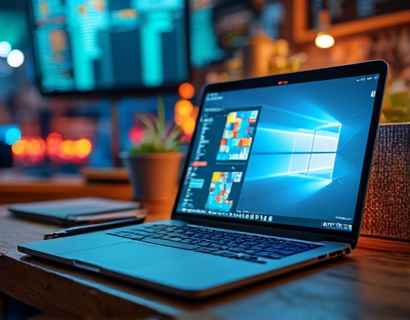Transforming Business Collaboration: The Power of Decentralized File Management
In the rapidly evolving landscape of business operations, the need for efficient and secure file management has become paramount. Traditional centralized file management systems often struggle to keep up with the demands of modern teams, leading to bottlenecks, security risks, and decreased productivity. Enter the realm of decentralized file management, a revolutionary approach that is redefining how businesses collaborate and manage their data. This article delves into the benefits and functionalities of a pioneering online platform designed to streamline business collaboration through a secure and efficient decentralized file management system.
Understanding Decentralized File Management
Decentralized file management represents a paradigm shift from the conventional centralized model. In a decentralized system, data is not stored in a single location but is distributed across a network of nodes. This distribution ensures that no single point of failure exists, enhancing the overall security and reliability of the system. Each participant in the network has access to the data, which is encrypted and verified through consensus mechanisms, ensuring that only authorized users can access sensitive information.
The core advantage of decentralized file management lies in its ability to provide a robust, tamper-proof environment for data storage and sharing. Unlike centralized systems, which are vulnerable to hacks and data breaches, decentralized systems distribute the risk, making it extremely difficult for malicious actors to compromise the entire network. This inherent security makes it an ideal solution for businesses handling sensitive information, such as financial institutions, healthcare providers, and tech companies.
Enhancing Collaboration with Decentralized Platforms
One of the most significant benefits of decentralized file management is its impact on team collaboration. Traditional centralized systems often lead to siloed departments, where file access and sharing are restricted, slowing down the collaborative process. A decentralized platform breaks down these barriers, allowing team members to access and share files in real-time, regardless of their location.
The user-friendly interface of these platforms ensures that even those with minimal technical expertise can navigate and utilize the system effectively. Files can be organized into folders, tagged, and searched with ease, making it simple to locate the information needed to complete tasks efficiently. This streamlined approach not only saves time but also reduces the likelihood of errors and miscommunications.
Security Features of Decentralized File Management
Security is a top priority in any file management system, and decentralized platforms excel in this area. Each file is encrypted both in transit and at rest, ensuring that even if data is intercepted or accessed unauthorized, it remains unreadable. Additionally, access controls are granular, allowing administrators to set specific permissions for different users or groups. This level of control ensures that sensitive information is only accessible to those who need it, minimizing the risk of data breaches.
Another critical security feature is the use of blockchain technology, which provides an immutable record of all file transactions. This transparency ensures that any unauthorized access or modification is immediately detectable, adding an extra layer of security. The decentralized nature of the network also means that there is no central point of failure, further enhancing the system's resilience against cyber threats.
Improving Productivity Through Efficient Workflows
The efficiency gains from adopting a decentralized file management system are substantial. By eliminating the need for manual file transfers and version control, teams can focus on their core tasks without being bogged down by administrative overhead. The platform's intuitive design allows for seamless file sharing and collaboration, enabling team members to work together in real-time, regardless of their physical location.
Automated workflows and integration with other tools and services further enhance productivity. For instance, tasks can be assigned directly from the file management system, and progress can be tracked in real-time. This integration reduces the need for external tools, streamlining the workflow and minimizing the risk of data silos. As a result, teams can achieve more in less time, leading to increased productivity and better outcomes.
Case Studies and Real-World Applications
Several businesses across various industries have successfully implemented decentralized file management systems, reaping significant benefits. In the healthcare sector, a major hospital network adopted a decentralized platform to manage patient records and medical research data. The result was a dramatic reduction in data breaches and a significant improvement in the speed of data access, leading to faster patient care and more efficient research processes.
In the financial industry, a leading investment firm used a decentralized file management system to secure and share sensitive financial documents. The enhanced security measures and real-time collaboration capabilities allowed the firm to streamline its compliance processes and improve its response to market changes, ultimately leading to better decision-making and increased profitability.
These case studies demonstrate the versatility and effectiveness of decentralized file management in diverse business environments. By adopting such a system, organizations can not only enhance their security and efficiency but also gain a competitive edge in their respective markets.
Challenges and Considerations
While the benefits of decentralized file management are clear, there are several challenges and considerations that businesses should be aware of when implementing such a system. One of the primary challenges is the initial setup and transition from traditional centralized systems. This process requires careful planning and may involve training for staff to ensure a smooth transition.
Another consideration is the scalability of the decentralized platform. As businesses grow, the system must be able to handle increasing amounts of data and users without compromising performance. Selecting a platform that is designed to scale efficiently is crucial to avoid potential bottlenecks.
Interoperability is also an important factor. The platform should be able to integrate seamlessly with existing tools and systems to avoid disruptions and ensure a cohesive workflow. Compatibility with various file formats and third-party applications is essential for a smooth user experience.
Future Trends in Decentralized File Management
The future of decentralized file management is promising, with several trends shaping the evolution of these platforms. One such trend is the increasing adoption of artificial intelligence and machine learning to enhance security and efficiency. AI can be used to detect and prevent potential security threats in real-time, while machine learning algorithms can optimize file organization and retrieval processes.
Another trend is the integration of decentralized identity management, which allows users to control their digital identities and manage access permissions more effectively. This not only enhances security but also provides users with greater control over their data.
Furthermore, the rise of Web3 and the metaverse is opening new possibilities for decentralized file management. These emerging technologies are expected to create more immersive and interactive environments for collaboration, where files and data can be managed and shared in innovative ways.
Conclusion
Decentralized file management represents a significant advancement in the way businesses collaborate and manage their data. By offering a secure, efficient, and user-friendly platform, these systems are poised to transform the landscape of business operations. As more organizations recognize the benefits of decentralization, the adoption of such platforms is likely to grow, leading to a more connected, secure, and productive business environment.
Embracing decentralized file management is not just a technological upgrade; it's a strategic move towards a future where collaboration knows no bounds and data security is paramount. For businesses and teams seeking to optimize their information management processes, a decentralized approach is the way forward.











































